The document discusses the biblical invitation from Jesus to come to Him, emphasizing that everything is prepared for salvation and grace. It highlights God's careful planning and readiness in providing for His creation and underscores that believers should approach Him with confidence, regardless of their feelings of readiness. The message conveys that God has already laid the groundwork for spiritual sustenance and urges individuals to accept the invitation to partake in His grace without delay.

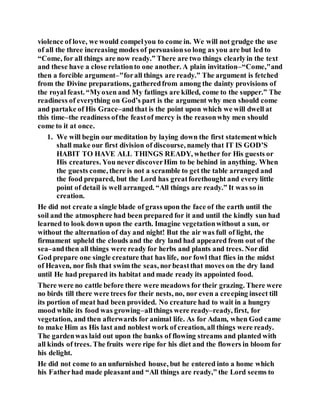
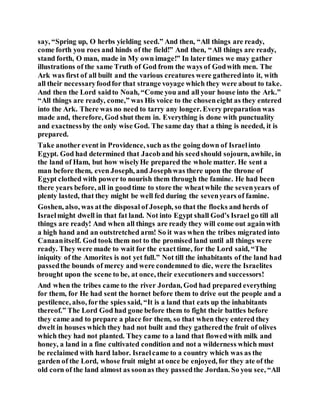
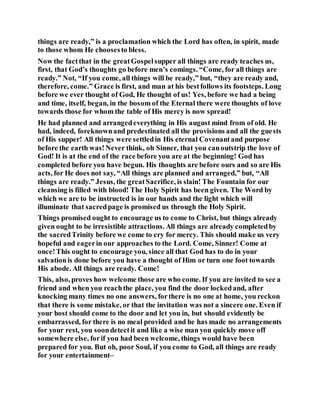
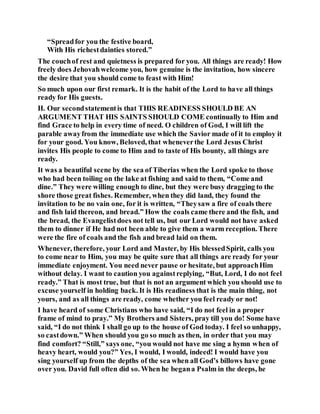

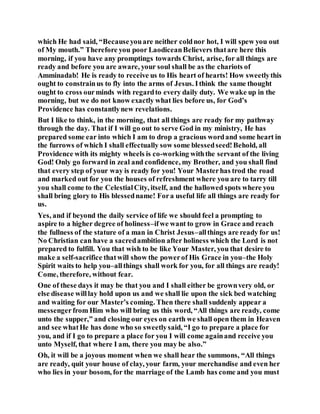
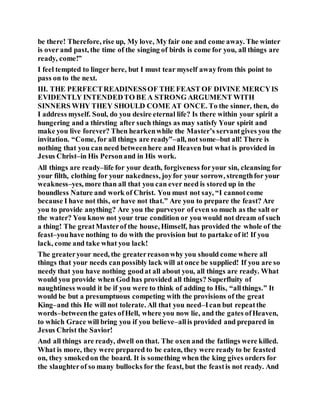











































![4. Fora useful life in the path of daily duty, all things are ready.
5. Fora higher degree of holiness all things are ready.
III. THE PERFECTREADINESSOF THE FEAST OF DIVINE MERCYIS
EVIDENTLY INTENDEDTO BE A STRONG ARGUMENT WITH
SINNERS WHY THEY SHOULD COME AT ONCE.
1. All things are ready.
2. All things are ready.
3. All things are now ready. Therefore, come now.
IV. THIS TEXT DISPOSESOF A GREAT DEAL OF TALE ABOUT THE
SINNER'S READINESS OR UNREADINESS. He only needs to be willing.
(C. H. Spurgeon.)
Form of Easterninvitations
Biblical Things not Generally Known.
When a person of respectable rank in societyproposes to celebrate a feastin
his house, he forthwith circulates his invitations to the friends he wishes to be
of the party, either by card or by a verbal message, carriedby a servant of the
house, or a person hired for the purpose, and superbly decked, according to
the rank of his employer. The following is a specimenof the form of
invitation: "Sucha person [naming him] sends best compliments to such
another person [naming him also], and begs to inform him that as to-morrow
there is a little gaiety to take place in his house, and he wishes his friends, by
their presence, to grace and ornament with their feetthe house of this poor
individual, and thereby make it a garden of roses, he must positively come and
honour the humble dwelling with his company." Having after this fashion
gone to all the houses, and returned with assurance from the invited friends of
their intention to come next day, a messengeris againdespatchedfor them at
the appointed time, to inform them that all the preparations for the banquet
are completed. This secondinvitation is included by our Lord, and is very
characteristic ofEasternmanners. When Sir John Malcolmwas invited to
dine with the eldest sonof the Shah, the invitation was given two days before,
and one of the prince's attendants was despatchedat the hour appointed for
the banquet to tell him that all things were ready. And Morier also informs us,
that having been engagedto dine with a PersianKhan, he did not go till his
entertainer had sentto the English ambassadorand his train to say that
supper waited. After the same manner, the invitations to the great supper](https://image.slidesharecdn.com/jesuswassayingcomeallisready-200509033040/85/Jesus-was-saying-come-all-is-ready-52-320.jpg)























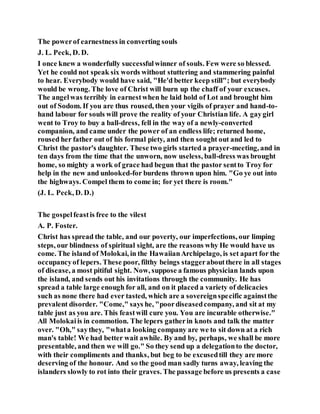
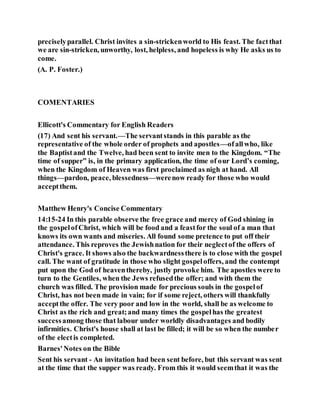
![custom to announce to those invited just the time when the feastwas
prepared. The custom here referred to still prevails in Palestine. Dr. Thomson
("The Land and the Book," vol. i. p. 178)says:"If a sheikh, beg, or emeer
invites, he always sends a servant to call you at the proper time. This servant
often repeats the very formula mentioned in Luke 14:17; Tefŭddŭlû, el 'asha
hâder. Come, for the supper is ready. The factthat this custom is mainly
confined to the wealthy and to the nobility is in strict agreementwith the
parable, where the certainman who made the greatsupper and bade many is
supposedto be of this class. It is true now, as then, that to refuse is a high
insult to the maker of the feast, nor would such excuses as those in the parable
be more acceptable to a Druse emeerthan they were to the lord of this 'great
supper.'"
Jamieson-Fausset-BrownBible Commentary
17. supper-time … all now ready—pointing undoubtedly to the now ripening
preparations for the great Gospelcall. (See on [1670]Mt22:4.)
Matthew Poole's Commentary
See Poole on"Luke 14:16"
Gill's Exposition of the Entire Bible
And sent his servant at supper time,.... Either John the Baptist, the harbinger
and forerunner of Christ, who declaredthat the kingdom of heaven, or the
Gospeldispensation, was at hand; and exhorted the people to believe in Christ
that should come after him; or Christ himself, who is God's servant as man, of
his choosing andappointing, and whom he sentin the fulness of time in the
form of a servant, as the minister of the circumcision, to the lost sheepof the
house of Israel, and to callsinners to repentance;or servantmay be put for
servants, since in Matthew 22:3 mention is made of more; and so the Persic
version here; which parable bears some likeness to this, if it is not the same;
and may designthe apostles ofChrist, who were the servants of the most high
God, and the ministers of Christ, who were first sent by him to preachthe
Gospelto the Jews, and to them only for a while:
to say to them that were bidden, come: this call, or invitation, was not the
internal call, which is a fruit of love, and by grace, andof mighty power; to
specialblessings, grace, andglory; and is irresistible, effectual, and
unchangeable:but external, to outward ordinances:and is often slighted and
neglected;and is sometimes of persons who are neither chosen, nor sanctified,
nor saved:](https://image.slidesharecdn.com/jesuswassayingcomeallisready-200509033040/85/Jesus-was-saying-come-all-is-ready-78-320.jpg)
![for all things are now ready; the Syriac version adds, "for you":
righteousness, pardonof sin, peace, and reconciliation, sin put awayby the
sacrifice ofChrist, redemption obtained, and life and salvation secured;which
shows the perfection of the present dispensation, and the large provisions of
the Gospel, to which nothing is, or canbe brought to be added to them, or
qualify for them.
Geneva Study Bible
And sent his servant at supper time to say to them that were bidden, Come;
for all things are now ready.
EXEGETICAL(ORIGINAL LANGUAGES)
Expositor's Greek Testament
Luke 14:17. εἰπεῖν τοῖς κεκλημένοις:a secondinvitation according to Eastern
custom still prevailing (Rosenmüller, Morgenland, ver .192;Thomson, Land
and Book, vol. i. chap. ix.).
Cambridge Bible for Schools andColleges
17. sent his servant at supper time] This is still a custom in the East, Proverbs
9:1-5; Thomson, Land and Book, i. ch. 9: The messageofthe servant
corresponds to the ministry of John the Baptist and of Jesus Himself.
Come; for all things are now ready] “Repentye; for the kingdom of heaven is
at hand,” Luke 10:1; Luke 10:9; Matthew 3:1-2.
Bengel's Gnomen
Luke 14:17. Εἰπεῖν, to say) The successive steps ofthe gradation are to be
observed:Luke 14:17, εἰπεῖν, to say, κεκλημένοις, to the called: Luke 14:21,
εἰσάγαγε, bring in, τοὺς πτωχοῦς, the poor: Luke 14:23, ἀνάγκασον, compel,
εἰς τὰς ὁδοὺς, i.e. those who are in the highways, etc. The call goes forwardto
those that are at a greaterdistance, and by its continually increasing urgency
it compensates forthe delay previously incurred. [The called are of Israel.—
V. g.—ἤδη)alreadynow. Herein the time of the New Testamentis shown to be
the presenttime.
Pulpit Commentary
Verses 17-20. -Come; for all things are now ready. And they all with one
consentbeganto make excuse. The excuses, viewedas a whole, are paltry, and
"if," as it has been wellsaid, "as a mere story of natural life it seems highly
improbable, it is because men's conduct with regard to the Divine kingdom is
not according to right reason... The excuses are all of the nature of pretexts,](https://image.slidesharecdn.com/jesuswassayingcomeallisready-200509033040/85/Jesus-was-saying-come-all-is-ready-79-320.jpg)












![actively (Luke 12:35-53)and unbelievers must make peace with God before it
is too late (Luke 12:54-59)with the right kind of religion, one of repentance
(Luke 13:1-9).
Jesus encouragesus to embrace the Kingdom of Grace (Luke 13:10-17)which
begins humbly and grows rapidly to embrace the nations (Luke 13:18-21). It is
a Kingdom of Repentance with a strict deadline (Luke 13:22-30), its rejection
having dire consequences(Luke 13:31-35). It is a Kingdom of Provision of
healing (Luke 14:1-6), honor (Luke 14:7-14), and harvest (Luke 14:15-24).
Sermon Points:
1. Jesus invites you to a Banquet of healing (Luke 14:1-6)
2. Jesus invites you to a Banquet of honor (Luke 14:7-14)
3. Jesus invites you to a Banquet of harvest (Luke 14:15-24)
Exposition: Note well,
1. JESUS INVITES YOU TO A BANQUET OF HEALING (Luke 14:1-6)
a. Jesus’teaching is setin the context of a meal at the home of a prominent
Pharisee (as in Luke 7:36; 11:37). It was a banquet ostensibly to honor the
Lord, but really to continue to measure everything he saidand did. Eating
bread togetherwas supposed to be an occasionforintimate fellowship. The
treacheryof the Pharisees wouldbe repulsive to ancient hearers. The original
phrase here means that they were “insidiously watching on the sly, with evil
intent.” As bait, they placed a man with dropsy in front of him, apparently on
a Sabbath day. Dropsy(Greek:hydropikos), medically known as edema, an
excessive accumulationof serous fluid in tissue spaces orbody cavities,
causing excessiveswelling. It is a symptom pointing to a more serious
condition possibly with the kidney, liver, blood, or heart.
b. This is the lastof the five Sabbath miracles in Luke.[1] It didn’t take a
brainiac to figure out what they were up to. Jesus therefore asks, “Is it lawful
to heal on the Sabbath or not?” No one will answer, for they knew the Law
permitted works of mercy on Sabbath. Under rules of debate, by being
silencedand unable to reply, they would be presumed wrong or at best too](https://image.slidesharecdn.com/jesuswassayingcomeallisready-200509033040/85/Jesus-was-saying-come-all-is-ready-92-320.jpg)
![ignorant of the law to defend their position. The Pharisees can’tanswer
because it would reveal their swollenhypocrisy which has puffed them up
more than a man with edema. Jesus cures the man.
c. APPLICATION: Jesus doesn’thealjust symptoms, He heals causes. He
heals root issues.
d. Jesus heals the man apparently while the guests were assembling. Jesus
reminds them that they would rescue an animal trapped on Sabbath without
breaking it (Deut 5:14). Not only that, while no cooking was done on Sabbath,
it is remarkably double-standarded to serve a banquet on Sabbath without
some labor. It proves that there was little real seriousnessaboutkeeping
Sabbath, how fastand loose they could play with their own convictions, how
taking care of selfwas always more important than really striving towardany
real spiritual relationship with the Lord.
e. APPLICATION: Legalismblinds us and makes us short-sighted. It blinds
us to anyone who doesn’t follow our lists of acceptable behavior. It makes us
short-sightedto the needs of our world.
2. JESUS INVITES YOU TO A BANQUET OF HONOR (Luke 14:7-14)
a. The host relieves the awkwardtensionof the healing by inviting everyone
to the table. The table is U-shaped, and places of honor at banquets were those
closestto the host. At the bottom-center of the U is the seatof highest honor,
descending in importance from there left and right. Jesus watches them
jockeyfor position for the best seats. He watches the haughty glow of those
who scoreda great seatnext to Rabbi So-and-So and the sulking eyes of those
who missed out and had to sit next to the kitchen. Having given a lessonon
Sabbath, Jesus proceeds to give one on humility, and He has a lot to point out
at this feastwhere the Pharisees spentso much energy promoting themselves,
vying for the positions of honor at the table.
b. Luke 14:8 – Jesus is here commenting on Proverbs 25:6-7: “Do not exalt
yourself in the king’s presence, and do not claim a place among greatmen; it
is better for him to say to you, ‘Come up here,’ than for him to humiliate you
before a nobleman.”
c. Luke 14:9 – One’s honor determined whom one could marry, with whom
one could do business, what functions one could attend, and where one could
live. The public shame of being moved from the first seatto the leastwould be
a humiliation almost worse than death.
d. Luke 14:11 – Exalting yourself: Echoing the words of Mary’s Magnificat
(Luke 1:52),[2] Jesus’spiritual principle is clear. Don’t push for glory. Let the](https://image.slidesharecdn.com/jesuswassayingcomeallisready-200509033040/85/Jesus-was-saying-come-all-is-ready-93-320.jpg)
![Lord honor you (Ezek 21:26). Only those who the Messiahhonors with a place
in his kingdom are truly honored. Those who honor themselves are worthy of
no honor.
e. Luke 14:12-14 – Jesus applies the principle in a fascinating way. If his host
really cares about honor from God, he should invite the poor and powerless,
who can never repay him in this life (Prov. 19:17). Jesus uses the word for a
formal dinner party or reception, a striking word for socialoutcasts.[3]Eating
with someone oflower socialstatus couldjeopardize one’s own social
standing. But Jesus says Godis concernedfor the poor. He will exalt the
person who cares forthe helpless, rather than the powerful who canrepay
you for your kindness.
f. APPLICATION:Pride backfires and makes us selfish. We start playing
the childish game of who’s better than whom. We always end up losing. We
naturally tend to seek recognitionand esteemfrom others, but Jesus says that
those who seek self-glorificationwill ultimately find themselves humbled,
while those who put others first will be exalted. The highest calling of a
Christian is to look out for others first, encouraging them to be all that God
would have them to be.
3. JESUS INVITES YOU TO A BANQUET OF HARVEST (Luke 14:15-24)
a. One of the guests seemedto get Jesus’point that He was pointing to the
future millennial kingdom.[4] The guestresponds in Luke 14:15 by alluding to
Isaiah25:6; cf. Luke 13:29). The Pharisee assumesthat all of Israelwould be
included in that future kingdom. But Jesus uses a parable to warn them that
participation in the kingdom would not be determined by physical lineage
from Abraham, but rather by spiritual lineage from Abraham who believed
God and it was credited to him as righteousness (similarto Luke 13:28-30).
b. Luke 14:17 - In the Middle Easterncontext, an invitation goes out and an
RSVP is sent. Then a secondinvitation comes when the meal is prepared
(Esther 6:14). To refuse to come once the invitation has been acceptedis not
only rude and insulting. It places a financial burden on the host.
c. Luke 14:18 - One is concernedwith material things (Luke 14:18). He just
bought a field. This is a bold lie since no one, especiallyin that culture, buys
land without knowing every square inch of it already. What an insult. The
field was more important than their relationship.
d. Luke 14:19 - One is more concernedwith his business (Luke 14:19).
Again, this excuse is probably a lie, for who buys ten oxen without seeing them
first? Insulting and rude. Property comes over friendship.](https://image.slidesharecdn.com/jesuswassayingcomeallisready-200509033040/85/Jesus-was-saying-come-all-is-ready-94-320.jpg)

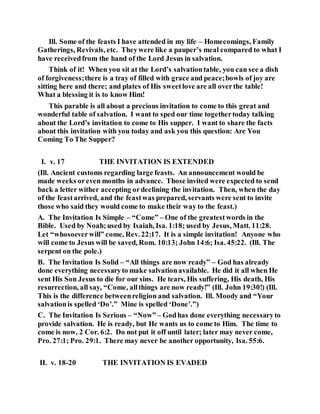




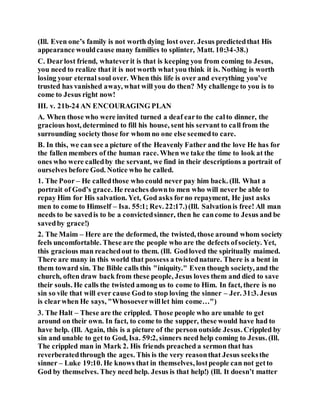



![On the radio you are listening to the services ofthe First Baptist Church in
Dallas. This is the pastor bringing the evening messageentitledRefusing God
with an Excuse. And the reading of the Scripture is in the Third Gospel;and
let us all turn to it. Matthew, Mark, Luke, the Third Gospel, the Gospelof
Luke, chapter 14;and we shall read from verses 15 through verse 23, 24.
Luke 14, and if you are listening on the radio, get your Bible and read it out
loud with us. And all of us in this great auditorium, reading it together, the
fourteenth chapter of the Gospelof Luke, beginning at verse 15 and reading
through verse 24. Now let us everyone read it together:
And when one of them that sat at meat with Him heard these things, he said
unto Him, Blessedis he that shall eatbread in the kingdom of God.
Then said He unto him, A certain man made a greatsupper, and bade many:
And sent his servant at supper time to say to them that were bidden, Come;
for all things are now ready.
And they all with one consentbeganto make excuse. The first said unto him,
I have bought a piece of ground, and I must needs go and see it: I pray thee
have me excused.
And another said, I have bought five yoke of oxen, and I go to prove them: I
pray thee have me excused.
And another said, I have married a wife, and therefore I cannotcome.
So that servant came, and showedhis lord these things. Then the master of
the house being angry saidto his servant, Go out quickly into the streets and
lanes of the city, and bring in hither the poor, and the maimed, and the halt,
and the blind.
And the servant said, Lord, it is done as thou hast commanded, and yet there
is room.
And the lord said unto the servant, Go out unto the highways and hedges, and
compel them to come in, that my house may be filled.
For I sayunto you, That none of those men which were bidden shall taste of
my supper.
[Luke 14:15-24]](https://image.slidesharecdn.com/jesuswassayingcomeallisready-200509033040/85/Jesus-was-saying-come-all-is-ready-105-320.jpg)
![Can you imagine such a thing? Can you think of such a thing? Yet our Lord
told that parable as a characterizationofthe vast majority in this world. For
God’s goodness, andGod’s grace, andGod’s forgiveness,and God’s love, and
God’s salvation is like a vast, marvelous, interesting, sumptuous, luscious
banquet; and when God invites men to share His grace, andHis goodness,and
His love, and His mercy, and all the bounties of life, most men turn Him down
with an excuse.
One of them said, "I have bought a piece of ground, and I must needs go and
see it: I pray thee have me excused" [Luke 14:18]. Isn’t that an amazing
thing? Buy a piece of ground and he hadn’t even seenit. Not many people do
that; but this guy says he did it. "I can’t come to the banquet; I’ve bought me
a piece of property and I haven’t lookedat it. I got to go see it now that I’ve
bought it, after I’ve bought it." Isn’t that an amazing thing? Then the other
fellow says, "I can’t come: I pray thee have me excused. I have bought five
yoke of oxen, and I go to try them, to see whetherthey can pull or not, see
whether they work or not" [Luke 14:19]. Isn’t that an amazing thing that a
man would buy five yoke of oxen, and he doesn’t even know whether they
plow or not, or whether they work or not, or whether they pull or not? Why,
they may be, they maybe like the cow I bought: she didn’t have any teeth.
You just don’t know what can happen when you buy things and you don’t
look at them. "I have bought five yoke of oxen, and I go to prove them: I pray
thee have me excused." But this other guy is a humdinger; he takes the cake.
The third one said, "I have married a wife, therefore I just cannot come. I
have married a wife, and therefore I cannotcome" [Luke 14:20]. Whole lot of
fellows do that, whole lot of fellows do that; all kinds of excuses,but the one
that’ll really stump you is when the fellow’s gota wife and he says, "Preacher,
I just can’t be there. I can’t be there." She’s got him out doing this, and she’s
got him out doing that, and she’s gothim out doing the other thing, and the
rest of his life she’ll be having him out doing those things, and he can’t come.
Well, these are all, as the Lord has described, they are all excuses;they’re not
reasons, theydon’t hold water, they don’t stand at the judgment bar of God,
and the Lord can see through the flimsy misty cheeseclothfabric of every one
of them. They’re just nothing. Yet they give the reasonto God, the excuse to
God, why a man doesn’t come to the Lord.
Now I used to wonder at that. How in the earth is it that men can know of
God and know of the gospeland of the goodthings that God has to offer,
freely given away, and yet refuse them? How is that? And the plain and
simple answeris found in an Old Testamentprophet by the name of
Zechariah, in the third chapter of his book and the first verse: "And God](https://image.slidesharecdn.com/jesuswassayingcomeallisready-200509033040/85/Jesus-was-saying-come-all-is-ready-106-320.jpg)
![showedme Joshua the high priest standing before the Angel of the Lord, and
Satanstanding at his right hand to resisthim" [Zechariah 3:1]. That’s why:
whenevera man comes face to face with God, and the Lord appeals to his
heart, right by the side of that man is Satantrying to undo every invitation
God gives, and trying to gainsayand repudiate every invitation the Lord
makes. And there’s nobody that stands in the presence of the Lord and hears
the invitation of Christ but that has that conflict in his heart. While God is
pleading, Satanis resisting, and he’s saying all kind of things in your heart
why it is you ought not to respond.
Now the sermontonight. Just as quickly as I cansay these things, and as long
as we have time, I want to point out to you some of those things that Satan
says in your heart, these excuses that he puts in your mouth. When a man
bids you to Christ in the name of God, Satan resists, andhe whispers these
things in your heart, and here’s what he says. The first thing he’ll say to you
is this: "Now you listen to me, now you listen to me," says the devil, "now you
listen to me," says Satan, "Now you listen to me: he’s just trying to rush you.
You don’t want to make that decisionnow. You don’t want to give your heart
to God now. You don’t want to be savednow. He’s just trying to rush you.
You’ve gotlots of time; you’ve gotplenty of time. Man, think it over. Man,
put it off. Man, do it some other day, some other time, but not now: this guy’s
just trying to push you into it; he’s trying to rush you."
Well, that’s a strange thing in the kind of a world in which we live; because
this world is like a sinking ship; this world is like a planet on fire; this world is
filled with the judgment and the death of an almighty God. "It is appointed
unto men once to die, and after that the judgment" [Hebrews 9:27]. And
there’s not a man that lives who does not realize that and does not know that.
We stand in the way of a flood and of a storm and of a furious raging
judgment; and for a man to stand facing these things and not make
preparation for them is the most unthinkable thing that mind could conceive
of. What would you think if a man ran to his friend on a sinking ship and
said, "Man, this ship is sinking, the lifeboat, the lifeboat," and the fellow
replied, "Oh, you’re just trying to rush me, you’re just trying to rush me"?
What would you think of a family that stoodin the way of a flood, the dam
has broken, and the great tidal wave is coming down the valley, and you ran
to warn the family, and they said, "Oh, you’re just trying to rush me; you’re
just trying to rush me"? What if you were in the path of an atomic bomb and
somebody came and said, "Escapefor your life"? "Ha, ha, you’re just trying
to rush me; you’re just trying to rush me."](https://image.slidesharecdn.com/jesuswassayingcomeallisready-200509033040/85/Jesus-was-saying-come-all-is-ready-107-320.jpg)
![I was in Hiroshima, as some of you know, not long after that bomb was
dropped. And the awful scars that holocaustmade in that valley there where
that city is built: they were everywhere evident. And [Buntaro] Kimura, the
pastor of our Baptist church in Hiroshima, in the days of the war, was
conscriptedand he was working in a factory outside of town at the edge of the
city. And as you know, that bomb burst in the very heart of the city, over the
city hall. And Kimura said, when I askedhim, "What was it like," he said,
"We were working in the factory where I was conscriptedand sentby the
Japanese government, and I was working in a munitions factory." And he
said, "Suddenly it seemedas though the sun burst! It was a brilliant, blinding
flash of light, and then soona blast that knockedus all to the floor." I said,
"What did you do?" He said, "Immediately, the Japaneseauthorities sent us
all into the city to minister to the dying, and the bleeding, and the wounded,
and to try to getthem to hospitals and to doctors whereverwe could find them
in this part of Japan." And I could imagine as that preacher Kimura went to
these who were bleeding and dying, wounded sore, and say, "We must take
you to the doctor, we must get to the hospital," and these who were dying say
to Kimura the preacher, "Oh, fellow, don’t getexcited, we’ve gotlots of time.
We’ve got lots of time." Bleeding to death, but we’ve gotlots of time. Facing
death, but we have lots of time. "Don’t try to rush me. You’re trying to get
me into a decision, and I’ve gotall of my life." Yeah, isn’t that interesting.
In the Talmud I read this story. One of those fellows went up to the rabbi and
said, "Rabbi, how long do I have to repent to get right with God?" And the
rabbi said to him, "You’ve gotthe rest of your life; you’ve got the rest of your
life."
"Wellfine," said the fellow. "Well, Rabbi, how much is the rest of my life?
How long am I going to live?" And the rabbi said, "Sir, nobody knows, and
you don’t know;and that means you better getright with God now. You
better repent now." That’s a flimsy excuse that Satanputs in a man’s mind to
push him awayfrom Christ: "You just wait a while, he’s trying to rush you;
he’s trying to rush you."
Here’s anotherexcuse that Satanputs in the heart of a man when he’s invited
to come to God and to believe in Christ. Here’s another thing Satanwill
whisper in his heart, and he’ll say to him, "Now you listen here, you listen
here: there’s a whole lot of things you don’t know anything about. There’s a
whole lot of that that you don’t understand. There are a greatmany
mysteries in this thing that are inexplicable. This thing they call the new
birth, being born again[John 3:7-18], and the atonement of Christ [Hebrews
2:17], and all of those things; you don’t know all of those things, you don’t](https://image.slidesharecdn.com/jesuswassayingcomeallisready-200509033040/85/Jesus-was-saying-come-all-is-ready-108-320.jpg)
![understand those things. And you just wait until you understand them, and
then you cangive your heart to God."
Oh man, and that’s a cogentthing; I meet it all the time. And yet, I tell you
verily, with all the things that we don’t understand, and with all the mysteries
that we can’t explain, yet I tell you verily there’s not a man in this world that
doesn’t know the plain duty that God has for his life. Every man ought to get
right with God. Every man ought to turn and repent [Ezekiel33:11]. Every
man ought to acceptChrist as his Savior [Acts 16:30-31, 2 Peter3:9]. And
there’s no mystery at all about what a man ought to do. That’s plain and
simple. Then about understanding these things in life, man, you don’t
understand anything finally and actually: all you do is just observe it, all you
do is just watch it; but you don’t understand it, and you can’t explain it. But
that doesn’t keepyou from doing it. And if you didn’t you’d die; you couldn’t
live in this world. The things you don’t understand are everything. And what
you do understand is nothing. And all you do is just observe it.
There’s not a man in this earth that can explain to me eating, nobody can,
nobody can. The most brilliant men who everlived or shall ever live can’t
explain that thing of eating. How in the earth canyou take matter, dead inert
matter, there it is on the table, and it becomes you; it’s turned into heart and
soul and mind and life that can love and hate and respond and think and live,
you? That’s you. As I look at you, that’s what you are. Beans and potatoes
and steak and gravy, that’s what you are. Oh, you say, "Preacher, yougot me
down wrong; that’s not what I am." Well, you just leave eating off for a
while, just quit eating for a while, and let’s see what you look like. Yet there’s
not a man in this earth that canunderstand the mystery of eating, of
assimilation. You just don’t; but you just eatanyway. Can’t understand it,
don’t know what it’s all about, but man let’s eat, let’s eat. All of life is like
that.
One of the most inexplicable mysteries in this world is the birth of a child, the
birth of a baby. Little old celland then it’s two cells;those two make four,
and those four make eight; and pretty soonthere’s a little bud here, little bud
there, and there’s a leg, and here’s a leg, and here’s his brain, there’s his
backbone, and give it time and by and by there comes into this world
somebody like you – the Lord help us – somebody like you, a reproduction of
you, an amazing thing. And how does it come to pass? Nobody can
understand. Those carpenters in there making teeth buds, and those chiselers
in there making all kinds of bones, and those sculptors in there framing a
skull, it’s an amazing thing, and nobody understands it; but there it is all
around us. We see it every day: the mystery of life.](https://image.slidesharecdn.com/jesuswassayingcomeallisready-200509033040/85/Jesus-was-saying-come-all-is-ready-109-320.jpg)

![universe; I can explain how it all got here and how it all works." Thatman
the Bible says is a what? A f-oo-l: "The foolhath said in his heart, There is no
God" [Psalm 53:1]. What does the Book say? "The beginning of wisdom is
the fear, the reverentialawe of the Lord" [Proverbs 9:10]. That’s the first
sentence;that’s the first grammarian’s rule; that’s the first principle; that’s
the first foundational statement;that’s the first corollary; that’s the first
axiom; that’s the first great revelation. "In the beginning God" [Genesis 1:1],
and we start from there, and are educated in His school.
But we’re talking about these things that Satan whispers in a fellow’s heart,
and whispers like this, "Now you just wait. Don’t you listen to that preacher,
don’t you come down that aisle, don’t you give your heart to the Lord, now
you just wait. You’re coming along good, you’re doing good, you’re just
coming along fine. Conversionis a progressive thing, and by and by you’ll get
there."
Now you listen: conversionis a beginning and a beginning is never
progressive. We eitherstart or we don’t start. We either begin or we don’t
begin. We do or we don’t do. We say yes or no. We’re in the kingdom or
we’re out of it. We’re savedor we’re lost. It’s one or the other; there’s no
such a thing as a middle ground betweenthe two. And a man either obeys the
gospelof Christ and does what Christ says, orhe doesn’t obey the gospelof
Christ and he doesn’tdo what Christ says. And it’s that plain and that
simple. And that’s what it is to be saved: for a man to say yes to God and to
say "yes" to Christ, and "Here I am, and here I stand, and here I come." It’s
that simple, it’s that plain.
Some of you all have had this experience:your child, and they all go through
these things, your child gets angry, you interdict or you say something and it
doesn’t please the youngster, and so he may slam the door as he goes out of
the room, or pick up a book and slams it down on the floor. All right, what do
you do? Okay, there’s the book slammed down on the floor, and you say,
"Now, come here, honey, come back here. You see that book on the floor?
Now you pick up that book real nice and set it on the table."
"Well, well, well, let me pray about it, let me pray, I need to pray."
"No, pick up that book and put it on the table."
"No, let me mourn about it for a while, let me be burdened about it for a
while."
"No sir, you just pick this book and put it on a table."](https://image.slidesharecdn.com/jesuswassayingcomeallisready-200509033040/85/Jesus-was-saying-come-all-is-ready-111-320.jpg)
!["Yeah, but let me, let me do some other things for you. Let me washthe
dishes or shine your shoes orsweepthe floor. Let me do something else."
"No sir, you pick up that book and put it on the table." And until that child
does that, there’s no obedience in the heart of that youngster; and it’s that
plain and that simple. God says to bow. God says to confess. Godsays to
trust. God says to come. God says to confess. Godsays to give your heart to
Jesus. Until you do it, nothing is done, howeveryou pray, howeveryou
mourn, howeveryou seek. Firstobeywhat Godsays. Pick up that book, put
it on the table nice like; then all the other things will follow after.
And Satanwhispers in your mind, and he says, ‘Don’t you listen to that
preacher. Don’t you listen to that preacher. Listen, I gotlots of things that
are just as good, lots of things. Be altruistic, philanthropic, be generous. Or
give to these civic things and all of the needs, and live a fine moral life, and
join the clubs, and join the fraternities, and be active in the work of
ministering to needy people, and you’ll getto heavenall right. Anything
exceptgive your heart to God, anything," says Satan, "exceptbow before
Jesus and acceptHim as your Savior."
I went to see a man who was dying in the hospital; and the family askedme to
go see him and pray for him and try to get him to the Lord. And so I went
and talkedto him and prayed with him and beggedwith him. And you know
what that man’s eternal answerwas to me? And he died saying these words:
on his finger he had a ring of a fraternal organization, and when I pled and
beggedfor Christ, he held up his finger and he pointed to that ring and he
said, "Thatring will getme into heaven." He died that way. Oh!
Though I speak with the tongues of men and of angels, and have not Christ, I
am a sounding brass and a clanging cymbal. And though I have the gift of
prophecy, and understand all mysteries, and all knowledge;and though I have
all faith, so that I could move mountains, and have not Christ, I am nothing.
And though I bestow all my goods to feed the poor, and though I give my body
to be burned, and have not Christ, it profiteth me nothing.
[1 Corinthians 13:1-3]
The all in all of God’s heaven is the Lamb, His Sonand our Savior.
And in this last little moment – I tell you thirty minutes goes by before you
just getstarted, doesn’tit? And in this last little moment, as the preacher
pleads for Jesus, he [Satan] whispers in your heart, "Now wait, you’re not
ready to come. You’re not ready to come. Manlook at this in your life, and](https://image.slidesharecdn.com/jesuswassayingcomeallisready-200509033040/85/Jesus-was-saying-come-all-is-ready-112-320.jpg)
![look at that in your life, and that, and that, that, that. Now you patch those
things up first; you patch that up, you patch that up, and you patch that up.
And then some of these days, when you getgood enough, and when you’ve got
it all patched up, why, then you go down that aisle and give your heart to
Jesus, and be baptized, and belong to His church." And you follow that
advice and you’ll never come. Do you remember the old, old song?
Come, ye sinners,
poor and needy,
Lost and ruined by the fall;
If you tarry till you’re better,
You will never come at all.
I will arise and go to Jesus,
He will embrace me in His arms;
In the arms of my dear Savior,
O there are ten thousand charms
["Come, Ye Sinners, Poorand Needy," by JosephHart]
Do you think Jesus calls us because we’re good? Do youthink He loves us
because we’re lovely? It’s just the opposite: it’s because we’re unlovely, and
because we’re lost, and because we’re sinners that He came to this world to
die for us [Matthew 1:21; John 12:27; Hebrews 10:5-14]. And He bids us
come to Him [Matthew 11:28], sin and all, dirt and all, filth and all, lostness
and all, "Come just like you are." Godbids you; God wants you, just like you
are.
In the days of this last terrible World War, as you know, at Temple, Texas
they built a hospital there for amputees, McCloskeyHospital. And we had in
our church, and one of our deacons, anillustrious doctor, and he had taught
in the medical schoolin Dallas. And one of his students, a medical doctor, was
the head of McCloskeyHospital, the coloneldown there. And the physician
here in our church said, "Preacher, come withme and let’s go down and visit
the hospital and see my old student."
So we spent the day down there in that hospital. Made an impression on my
soul I’ll never in this earth forget. And out of those boys that we saw – some](https://image.slidesharecdn.com/jesuswassayingcomeallisready-200509033040/85/Jesus-was-saying-come-all-is-ready-113-320.jpg)
![of them like stumps, hands and legs and just pieces – one of them was a young
officer who in his terrible wounds, he’d lost his eyes;shrapnel had takenout
his eyes and he was blind. And we visited with him in his room. And as we
talkedto him, somewhere, somewhere onthe WestCoastthere was a
wonderful young wife, and she sent him words of encouragementand wrote
him letters of love and cheer. And the young fellow said as we visited with
him, he said, "Oh, I’m so happy." He said, "Justthink: three more weeks,
three more weeks, andI’ll see my wife – three more weeks,three more
weeks." Well, you know, I got so wrapped up in the enthusiasm of the boy
that I never caught it at the time; but as I walkedaway, I happened to think,
"Why, he said, ‘Three more weeksand I’ll see my wife.’" Why man, he’s
blind. He’s blind! "Three more weeksand I’ll see my wife." And then the
whole thing came before me: why, that blessedgirl, wherever she was, and
whoevershe is, that blessedgirl had so made that young man wanted and
loved that he’d forgothe was blind. "Three more weeks andI’ll see my wife."
He’d absolutely forgottenof the tragedy of the war.
That’s Jesus. Manit’s because we’re blind, and because we’re crippled, and
because we’re sinners, and because we’re lostthat God bids us come [Luke
19:10]. That’s the reason for coming to Jesus. And let’s do it now. Let’s do it
now. While we sing this hymn of invitation, somebody you, give your heart to
Christ. Somebody you, putting your life in His blessedhands, in this balcony
round, on this lower floor, while we sing the appeal, make it tonight;
"Preacher, Igive you my hand; I give my heart to God, and here I come, and
here I stand, and here I am." Make it now, while we stand and while we sing.
STEVEN COLE
How to Have Dinner With Jesus (Luke 14:15-24)
RelatedMedia](https://image.slidesharecdn.com/jesuswassayingcomeallisready-200509033040/85/Jesus-was-saying-come-all-is-ready-114-320.jpg)
























![discourse, so wonderfully well-pleasedwas he with what he said and he knew
nothing more likely to engage him than to mention the kingdom of God. Note,
Even those that are not of ability to carry on gooddiscourse themselves ought
to put in a word now and then, to countenance it, and help it forward.
2. Now what this man said was a plain and acknowledgedtruth, and it was
quoted very appositelynow that they were sitting at meat for we should take
occasionfrom common things to think and speak of those heavenly and
spiritual things which in scripture are compared to them, for that is one end
of borrowing similitudes from them. And it will be goodfor us, when we are
receiving the gifts of God's providence, to pass through them to the
considerationof the gifts of his grace, those betterthings. This thought will be
very seasonable whenwe are partaking of bodily refreshments: Blessedare
they that shall eatbread in the kingdom of God. (1.) In the kingdom of grace,
in the kingdom of the Messiah, whichwas expectednow shortly to be setup.
Christ promised his disciples that they should eatand drink with him in his
kingdom. They that partake of the Lord's supper eatbread in the kingdom of
God. (2.) In the kingdom of glory, at the resurrection. The happiness of
heaven is an everlasting feastblessedare they that shall sit down at that table,
whence they shall rise no more.
II. The parable which our Lord Jesus put forth upon this occasion, Luke
14:16, &c. Christ joins with the goodman in what he said: "It is very true,
Blessedare they that shall partake of the privileges of the Messiah's kingdom.
But who are they that shall enjoy that privilege? You Jews, who think to have
the monopoly of it, will generallyrejectit, and the Gentiles will be the greatest
sharers in it." This he shows by a parable, for, if he had spokenit plainly, the
Pharisees wouldnot have borne it. Now in the parable we may observe,
1. The free grace and mercy of God, shining in the gospelof Christ it appears,
(1.) In the rich provision he has made for poor souls, for their nourishment,
refreshment, and entertainment (Luke 14:16):A certainman made a great
supper. There is that in Christ and the grace ofthe gospelwhich will be food
and a feastfor the soul of man that knows its owncapacities, forthe soul of a
sinner that knows its own necessitiesandmiseries. It is called a supper,
because in those countries supper time was the chief feasting time, when the
business of the day was over. The manifestationof gospelgrace to the world
was the evening of the world's day and the fruition of the fulness of that grace
in heaven is reservedfor the evening of our day.
(2.) In gracious invitation given us to come and partake of this provision. Here
is, [1.] A generalinvitation given: He bade many. Christ invited the whole](https://image.slidesharecdn.com/jesuswassayingcomeallisready-200509033040/85/Jesus-was-saying-come-all-is-ready-139-320.jpg)
![nation and people of the Jews to partake of the benefits of his gospel. There is
provision enough for as many as come it was prophesiedof as a feastfor all
people, Isaiah 25:6. Christ in the gospel, as he keeps a goodhouse, so he keeps
an open house. [2.] A particular memorandum given, when the supper time
was at hand the servant was sentround to put them in mind of it: Come, for
all things are now ready. When the Spirit was poured out, and the gospel
church planted, those who before were invited were more closelypressedto
come in presently: Now all things are ready, the full discoveryof the gospel
mystery is now made, all the ordinances of the gospelare now instituted, the
societyof Christians is now incorporated, and, which crowns all, the Holy
Ghostis now given. This is the call now given to us: "All things are now ready,
now is the acceptedtime it is now, and has not been long it is now, and will not
be long it is a seasonof grace that will be soonover, and therefore come now
do not delay acceptthe invitation believe yourselves welcome eat, O friends
drink, yea drink abundantly, O beloved."
2. The cold entertainment which the grace ofthe gospelmeets with. The
invited guests declinedcoming. They did not say flatly and plainly that they
would not come, but they all with one consentbegan to make excuse, Luke
14:18. One would have expectedthat they should all with one consenthave
come to a goodsupper, when they were so kindly invited to it: who would
have refused such an invitation? Yet, on the contrary, they all found out some
pretence or other to shift off their attendance. This bespeaksthe general
neglectof the Jewishnation to close with Christ, and acceptofthe offers of his
grace, and the contempt they put upon the invitation. It also intimates the
backwardnessthere is in most people to close with the gospelcall. They
cannot for shame avow their refusal, but they desire to be excused:they all ato
mias, some supply horas, all straightway, they could give an answer
extempore, and needed not to study for it, had not to seek foran excuse.
Others supply gnomes, they were unanimous in it with one voice. (1.)Here
were two that were purchasers, who were in such haste to go and see their
purchases that they could not find time to go to this supper. One had
purchased land he had bought a piece of ground, which was representedto
him to be a goodbargain, and he must needs to and see whetherit was so or
no and therefore I pray thee have me excused. His heart was so much upon
the enlarging of his estate that he could neither be civil to his friend nor kind
to himself. Note, Those that have their hearts full of the world, and fond of
laying house to house and field to field, have their ears deaf to the gospel
invitation. But what a frivolous excuse was this! He might have deferred going
to see his piece of ground till the next day, and have found it in the same place](https://image.slidesharecdn.com/jesuswassayingcomeallisready-200509033040/85/Jesus-was-saying-come-all-is-ready-140-320.jpg)
![and plight it was now in, if he had so pleased. Another had purchasedstock
for his land. "I have bought five yoke of oxen for the plough, and I must just
now go and prove them, must go and try whether they be fit for my purpose
and therefore excuse me for this time." The former intimates that inordinate
complacencyin the world, this the inordinate care and concernabout the
world, which keeppeople from Christ and his grace both intimate a
preference given to the body above the soul, and to the things of time above
those of eternity. Note, It is very criminal, when we are calledto any duty, to
make excuses for our neglectof it: it is a signthat there are convictions that it
is duty, but no inclination to it. These things here, that were the matter of the
excuses, were,[1.]Little things, and of small concern. It had better become
them to have said, "I am invited to eatbread in the kingdom of God, and
therefore must be excusedfrom going to see the ground or the oxen." [2.]
Lawful things. Note, Things lawful in themselves, when the heart is too much
setupon them, prove fatal hindrances in religion--Licitus perimus omnes. It is
a hard matter so to manage our worldly affairs that they may not divert us
from spiritual pursuits and this ought to be our great care. (2.)Here was one
that was newly married, and could not leave his wife to go out to supper, no,
not for once (Luke 14:30):I have married a wife, and therefore, in short, I
cannot come. He pretends that he cannot, when the truth is he will not. Thus
many pretend inability for the duties of religion when really they have an
aversionto them. He has married a wife. It is true, he that married was
excusedby the law from going to war for the first year (Deuteronomy 24:5),
but would that excuse him from going up to the feasts ofthe Lord, which all
the males were yearly to attend? Much less will it excuse from the gospelfeast,
of which the other were but types. Note, Our affection to our relations often
proves a hindrance to us in our duty to God. Adam's excuse was, The woman
that thou gavestme persuadedme to eat this here was, The womanpersuaded
me not to eat. He might have gone and takenhis wife along with him they
would both have been welcome.
3. The accountwhich was brought to the master of the feastof the affront put
upon him by his friends whom he had invited, who now showedhow little they
valued him (Luke 14:21):That servantcame, and showedhis lord these
things, told him with surprise that he was likely to sup alone, for the guests
that were invited, though they had had timely notice a goodwhile before, that
they might order their affairs accordingly, yet were now engagedin some
other business. He made the matter neither better nor worse, but related it
just as it was. Note, Ministers must give accountof the successoftheir
ministry. They must do it now at the throne of grace. If they see of the travail](https://image.slidesharecdn.com/jesuswassayingcomeallisready-200509033040/85/Jesus-was-saying-come-all-is-ready-141-320.jpg)









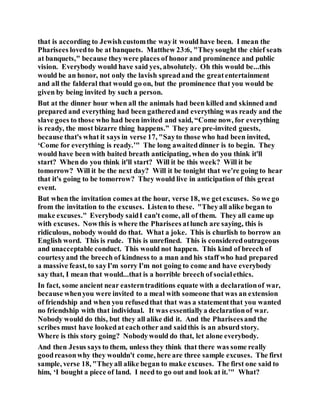







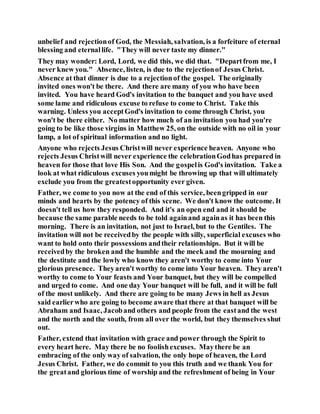





















![:16 A certainman gave a greatsupper
The certainman is God, who is going to give a great dinner in heaven.
The supper was actually described 700 years earlierby the prophet Isaiah:
(Isaiah 25:6–9 NLT) —6 In Jerusalem, the Lord of Heaven’s Armies will
spread a wonderful feastfor all the people of the world. It will be a delicious
banquet with clear, well-agedwine and choice meat. 7 There he will remove
the cloud of gloom, the shadow of death that hangs over the earth. 8 He will
swallow up death forever! The SovereignLord will wipe awayall tears. He
will remove forever all insults and mockeryagainsthis land and people. The
Lord has spoken!9 In that day the people will proclaim, “This is our God! We
trusted in him, and he savedus! This is the Lord, in whom we trusted. Let us
rejoice in the salvation he brings!”
This feastis intended to be for all people (Gentiles included).
The best part of the banquet will be that we will be with God face to face!!!
Keep in mind that Jesus is sitting with a bunch of Pharisees,the ultra-
orthodox super-strict. The Pharisees had some pretty strong opinions about
this greatsupper of God.
Severalcenturies after Isaiah, the idea of Isaiah’s banquet beganto change.
In the expanded Aramaic Old Testamenttranslation calledthe “Targum”,
Isaiah’s banquet lookedlike this:
Yahweh of hosts will make for all the peoples in this mountain a meal. And
although they supposed it is an honor, it will be a shame for them and great
plagues, plagues from which they will be unable to escape,plagues whereby
they will come to their end.[1]
In the secondcentury B.C., a document calledThe book of Enoch was written,
and included a description of Isaiah’s banquet.
It said that while the Gentiles would be included in the banquet, the angelof
death would show up, destroy all the Gentiles, and the banquet hall would run
with blood.
When the Qumran community wrote the “DeadSea Scrolls”, they were
certain that no Gentiles would be present at the banquet, and only pious Jews
would be allowedto attend. Their writings said that …](https://image.slidesharecdn.com/jesuswassayingcomeallisready-200509033040/85/Jesus-was-saying-come-all-is-ready-181-320.jpg)
![no one can attend the banquet who is “smitten in his flesh, or paralyzed in his
feet or hands, or lame, or blind or deaf or dumb or smitten in his flesh with a
visible blemish.”[2]
Can you see how God’s original banquet idea has been obscured? (you can’t
even see it on the screen…)
Instead of this banquet including many people from around the world, the
Pharisees sawthe banquet containing only a few, perfect, pious Jews.
We’re going to see Jesus challengethese very ideas.
:17 and sent his servantat supper time to sayto those who were invited,
‘Come, for all things are now ready.’
:17 sayto those who were invited
First the initial invitees gotthe invitation, but now word is out that the actual
event is about to take place.
It’s like you’ve been invited to a dinner party, and everyone is standing
around chatting in the living room, maybe playing “Twister”, whenword gets
out that the food is on the table and it’s time to eat!
The “invited” to the Pharisee mind would be the nation of Israel, the ones who
had already been “invited” to God’s heavenly supper through the Old
Testamentprophets.
In a way, the servant might representJesus and His apostles who were in the
process oftelling Israel that it’s time to come to God’s supper.
They were telling everyone that supper was ready.
In a way, the servant is a picture of all of us who follow Jesus.
:18 But they all with one accordbeganto make excuses.The first said to him,
‘I have bought a piece of ground, and I must go and see it. I ask you to have
me excused.’
:18 I have bought a piece of ground](https://image.slidesharecdn.com/jesuswassayingcomeallisready-200509033040/85/Jesus-was-saying-come-all-is-ready-182-320.jpg)















![(Luke 14:12-14) "Thensaid he also to him that bade him, When thou makest
a dinner or a supper, call not thy friends, nor thy brethren, neither thy
kinsmen, nor thy rich neighbours; lest they also bid thee again, and a
recompense be made thee. (13) But when thou makesta feast, callthe poor,
the maimed, the lame, the blind: (14) And thou shalt be blessed;for they
cannot recompense thee:for thou shalt be recompensedatthe resurrectionof
the just."
But there was one man in the crowd who heard and understood what the
Savior was saying. Look at verse 15.
(Luke 14:15) "And when one of them that satat meat with him heard these
things, he said unto him, Blessedis he that shall eatbread in the kingdom of
God."
It is in response to this man’s assertionthat our Lord spoke the parable
recordedin verses 16-24[1].
(Luke 14:16-24) "Thensaid he unto him, A certainman made a greatsupper,
and bade many: (17) And sent his servant at supper time to say to them that
were bidden, Come; for all things are now ready. (18) And they all with one
consentbeganto make excuse. The first saidunto him, I have bought a piece
of ground, and I must needs go and see it: I pray thee have me excused. (19)
And another said, I have bought five yoke of oxen, and I go to prove them: I
pray thee have me excused. (20) And another said, I have married a wife, and
therefore I cannot come. (21)So that servantcame, and showedhis lord these
things. Then the master of the house being angry said to his servant, Go out
quickly into the streets and lanes of the city, and bring in hither the poor, and
the maimed, and the halt, and the blind. (22) And the servantsaid, Lord, it is
done as thou hast commanded, and yet there is room. (23)And the lord said
unto the servant, Go out into the highways and hedges, and compel them to
come in, that my house may be filled. (24) ForI say unto you, That none of
those men which were bidden shall taste of my supper."
This is a parable full of instruction. May God the Holy Spirit now teachus its
meaning and apply it to our hearts.](https://image.slidesharecdn.com/jesuswassayingcomeallisready-200509033040/85/Jesus-was-saying-come-all-is-ready-198-320.jpg)

![But we dare not limit the parable’s messageto the Jews. This wordof God is
to be applied to all who are privileged to hear the gospelofthe grace ofGod.
The King of Heaven has made a greatsupper and bids you and me come to
the supper.
The Servant
Ver. 17. “And sent his servant at supper time”—The servant here may refer
to John the Baptist, or to the Lord Jesus, to the Apostles of Christ, or to the
Spirit of God[2]. Certainly, the servantis representative of every servantof
God who is sent forth to preach the gospelof the grace ofGod to perishing
sinners.
“To sayto them that were bidden, come”—Gospelpreachers are God’s
servants, sent forth into the world to callsinners to the table of grace, to call
sinners to Christ.
Now, watchthis. We proclaim, all God’s servants proclaim a feastof God’s
providing.—“for all things are now ready.”
· RighteousnessReadyto Wear
· Pardon Readyto Give
· Redemption to Bestow
· SalvationReady to Give
· Sonship Readyto Bestow
· No Gifts Accpted!
Excuses ForUnbelief
Ver. 18. “And they all with one consentbeganto make excuse”—Unbelievable
as it may appear, all who are called to Christ make excuses notto come. All
who are called make the same excuses. All who are called of God by the gospel
to life and salvationin Christ, all who are calledto believe on the Son of God,
all who are bidden to follow Christ, have (in their own minds) completely](https://image.slidesharecdn.com/jesuswassayingcomeallisready-200509033040/85/Jesus-was-saying-come-all-is-ready-200-320.jpg)




![[1] Though there are clearly points of similarity betweenthis and the parable
of the wedding feastin Matthew 22, these are two distinct parables, spokenon
two separate occasions.
[2] A. W. Pink wrote, “In Luke 14:16 we read, "A certain man made a great
supper, and bade many." By comparing carefully what follows here with
Matt. 22:2-10 severalimportant distinctions will be observed. We take it that
these passages are two independent accounts ofthe same parable, differing in
detail according to the distinctive purpose and design of the Holy Spirit in
eachGospel. Matthew's account - in harmony with the Spirit's presentation
there of Christ as the Sonof David, the King of the Jews - says, "A certain
king made a marriage for his son." Luke's account - where the Spirit presents
Christ as the Son of Man - says, "A certain man made a greatsupper and
bade many." Matt. 22:3 says, "And sent forth His servants;" Luke 14:17 says,
"And sent His servant." Now what we wish particularly to call attention to is,
that all through Matthew's accountit is "servants," whereasin Luke it is
always "servant." The class ofreaders for whom we are writing are those that
believe unreservedly, in the verbal inspiration of the Scriptures, and such will
readily acknowledgethat there must be some reasonfor this change from the
plural number in Matthew to the singular one in Luke. We believe the reason
is a weighty one and that attention to this variation reveals an important
truth. We believe that the servants in Matthew, speaking generally, are all
who go forth preaching the Gospel, but that the "Servant" in Luke 14 is the
Holy Spirit Himself. This is not incongruous, or derogatoryto the Holy Spirit,
for Godthe Son, in the days of His earthly ministry, was the Servant of
Jehovah(Isa. 42:1). It will be observedthat in Matt. 22 the "servants" are
sent forth to do three things: first, to "call" to the wedding (v. 3); second, to
"tell those which are bidden ... all things are ready; come unto the marriage
(v. 4); third, to "bid to the marriage" (v. 9); and these three are the things
which those who minister the Gospeltoday are now doing. In Luke 14 the
Servant is also sent forth to do three things: first, He is "to say to them that
were bidden, Come: for all things are now ready" (v. 17); second, He is to
"bring in the poor, and the maimed, and the halt, and the blind" (v. 21);
third, He is to "compelthem to come in" (v. 25), and the last two of these the
Holy Spirit alone cando!
In the above scripture we see that "the Servant," the Holy Spirit, compels
certain ones to come into the "supper" and herein is seenHis sovereignty, His
omnipotency, His divine sufficiency. The clearimplication from this word](https://image.slidesharecdn.com/jesuswassayingcomeallisready-200509033040/85/Jesus-was-saying-come-all-is-ready-205-320.jpg)







![uniform practice of our blessedSaviour [Note:See John 4:15; John 4:21;
John 6:34-35.]. The person, that addressedour Lord, seemedbut little
acquainted with the nature of the Messiah’s kingdom[Note:ver. 15.]. Our
Lord took occasionto rectify his apprehensions on that subject, and to shew
him, under the idea of a feast, that the provisions of his Gospelwould be
slighted by that whole nation. The parable in this view declares the rejection
of the Jews and the call of the Gentiles;but it is also applicable to nominal
Christians in all ages. Its import, as it respects us, may be comprised in two
observations:
I. God invites us to partake of the blessings of his Gospel—
The Gospeldispensationis fitly comparedto a sumptuous feast—
[In feasts everything is set forth that cangratify the palate. Thus in the
Gospelthere is every thing that can administer delight or vigour to the soul.
There is pardon for all the sins that we have ever committed: there is strength
againstall the corruptions or temptations that can assailus:there is
communion with God through our Lord Jesus Christ: there are foretastes and
earnests ofthe heavenly glory. On these accounts the prophets also spake ofit
under the image of a feast[Note:Isaiah25:6.].]
God sends his servants to invite men to his table—
[The first persons that were invited to it were the Jews. Upon their rejectionof
the Gospelthe Gentiles were to be called in [Note:Romans 11:11.]. The
invitation to us Gentiles is still continued: the servants of God are sent to
hasten your tardy steps. We are to inform you, that “all things are now ready,
and, as it were, waiting for you [Note:The blood, which is to cleanse you, is
already shed: the Spirit, that is to renew you, is already poured out: God is
reconciledand is ready to receive you: nothing is wanting, but that you come
and fill the place prepared for you.]: we are moreoverto urge you to accept
the invitation: we are to take, as it were, no denial from you [Note:It is the
force of persuasionwhich we are to use; not the force of penal statutes:such
compulsion as that, is as abhorrent from reason, as it is from religion.]. Such
is God’s desire to bless us with all spiritual blessings.]
Nor are any, howevermean or abandoned, to be overlooked—
[We are to go and callpeople of all ranks and descriptions:we are to search
out the persons most distant, most obscure, mostimpious [Note: This seems
intimated by the streets and lanes of the city, and the highways and hedges
without the city.]: we are to bring them in, howeverlabouring under
infirmities of body, or distress of soul [Note:“The poor, the halt,” &c. may
refer to their spiritual as well as temporal condition.]. God will have his](https://image.slidesharecdn.com/jesuswassayingcomeallisready-200509033040/85/Jesus-was-saying-come-all-is-ready-213-320.jpg)
![“house to be filled:” nor are his servants to desistfrom their labours till that
work be accomplished;and, thanks be to God! “there is yet room” for more.]
One would suppose that such rich blessings would meet with universal
acceptance:but,
II. We ungratefully rejectthem with vain and frivolous excuses—
Few find any inclination to acceptthe invitations of the Gospel—
[The Jews in their day withstood the solicitationof the Apostles:so now, all,
howeverimportuned, “beginto make excuse.” Some pleadthe importance of
their earthly business;others urge that they must attend to the concerns of
their families. Thus earthly cares, orcarnalease and pleasure, stupify the
world.]
But God will resent the contempt poured upon his mercy—
[The pleas urged in the parable are not sinful in themselves:but nothing,
howevergood, should keepus from attending to the one thing needful. Every
concernbecomes sinful, when it is inordinately followed. Hence God declares
that he is “angry” with those who offer such pleas: he threatens that they shall
never partake of the feastthey so despise, nor even “taste” ofhis bounty to all
eternity. “None,”howeverattentive to their worldly callings, shall find an
exceptionin their favour. How awful their state, who are never to taste of
pardon, peace, or glory! May we never bring upon ourselves so terrible a
doom!]
Address—
1. Those who are averse to acceptthe invitations of the Gospel—
[Every one is forward to offer pleas in extenuation of his guilt; and, while
some civilly beg to be excused, others roughly answer, “Icannot come.” But
whateverbe our plea, and in what way soeverit be offered, God will discern
its fallacy. Indeed the very persons who refuse our invitations, know that their
excuses will avail nothing in the day of judgment [Note:“I can not,” and “I
will not,” will then be found to have meant the same thing.]. What folly, then,
is it to offer that in justification of ourselves now, which will serve only to
condemn us in the last day! Let us no longer cherish such fatal delusions. We
may give to the world and our family a due portion of our care;but let
nothing keepus from the feastwhich God has prepared.]
2. Those who are afraid to come at the bidding of their Lord—
[Many are kept from Christ by an apprehension of their own unworthiness.
They think it would be presumption in them to accepthis invitation: but it is](https://image.slidesharecdn.com/jesuswassayingcomeallisready-200509033040/85/Jesus-was-saying-come-all-is-ready-214-320.jpg)
![not possible to describe more clearly the persons invited. If we be poor, or
halt, or maimed, or blind, we are expresslycalled; nor is our distance or
unworthiness any ground of exclusion. Let none then yield to unbelieving
fears. We would “compel” you all, by every argument we candevise. Reflect
on the greatness ofthe host that invites you, and the excellence ofthe feasthe
sets before you. Considerthe blessedness ofpartaking of it, and the certain
consequencesofabsenting yourselves from it [Note:If the Sacramentbe
administered, it may be observed, that the table is now spreadbefore their
eyes, &c.]. Let all come, and “delight their souls with fatness.” The command
given to the Church is yet addressedto you [Note: Song of Solomon5:1.]—]
A BAD EXCUSE IS WORSE THAN NONE NO. 578
A SERMON DELIVERED ON SUNDAY MORNING, JULY 3, 1864, BY
THE REV. C. H. SPURGEON, AT BAYSWATER.
“And they all with one consentbeganto make excuse.” Luke 14:18.
THE provisions of the Gospelof Christ may wellbe comparedto a supper,
provided as they were, in the evening of the world—“in these lastdays.” The
description, “a greatsupper,” is well borne out if we considerthe greatness of
the provision; how much love and mercy God has displayed towards the sons
of men in the person of Christ Jesus;how much of power and of gracious
working He has shown by His Holy Spirit. A greatsupper it is if we think of
the richness and sweetnessofthe provision—it is a feastworthy of the great
King. The flesh of Jesus is our spiritual meat, and His blood our choicestwine.
Our souls are satisfiedwith covenantmercies, mostfitly set forth as, “A feast
of fat things, a feastof wines on the lees, of fat things full of marrow, of wines
on the lees wellrefined.” A great supper it is, moreover, when we considerthe
number of guests invited. “Go you into all the world, and preach the gospelto
every creature.” The call of the Gospelcomes to every man and woman within
hearing of the ministers of God— “None are excluded thence, but those Who
do themselves exclude; Welcome the learned and polite, The ignorant and
rude.”](https://image.slidesharecdn.com/jesuswassayingcomeallisready-200509033040/85/Jesus-was-saying-come-all-is-ready-215-320.jpg)















